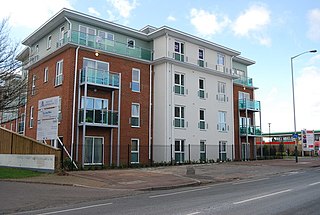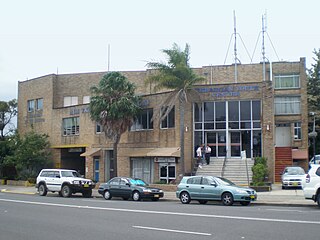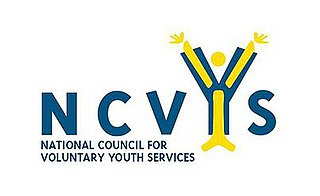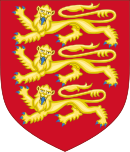
In Ireland and the United Kingdom, housing associations are private, non-profit making organisations that provide low-cost "social housing" for people in need of a home. Any budget surplus is used to maintain existing housing and to help finance new homes and it cannot be used for personal benefit of directors or shareholders. Although independent, they are regulated by the state and commonly receive public funding. They are now the United Kingdom's major providers of new housing for rent, while many also run shared ownership schemes to help those who cannot afford to buy a home outright.
Community politics is a movement in British politics to re-engage people with political action on a local level.

Youth work is a community support activity aimed at older children and adolescents. Depending upon the culture and the community, different services and institutions may exist for this purpose. In general, it provides an environment where young people can engage in informal educational activities. Throughout the United Kingdom, United States, and Canada, youth work is "to facilitate personal, educational, and social development." Through participative activities and coordinated programs, it seeks to enable young people in "gaining a voice, influence, and place in society in a period of their transition from dependence to independence." By nature and design these activities would be inclusive, educative, and empowering, and based on partnership, equality of opportunity, and respecting diversity.
Communities First was a Welsh Government programme aimed at reducing poverty. The programme was community focused and supported the most disadvantaged people in the most deprived areas of Wales with the aim of contributing to alleviating persistent poverty.

The European Structural and Investment Funds are financial tools governed by a common rulebook, set up to implement the regional policy of the European Union, as well as the structural policy pillars of the Common Agricultural Policy and the Common Fisheries Policy. They aim to reduce regional disparities in income, wealth and opportunities. Europe's poorer regions receive most of the support, but all European regions are eligible for funding under the policy's various funds and programmes. The current framework is set for a period of seven years, from 2021 to 2027.

The ULTACH Trust is a charitable trust established in 1989 aimed at promoting the Irish language in Northern Ireland. Its former director was Aodán Mac Póilin and is now Róise Ní Bhaoill.

The Convention of Scottish Local Authorities (COSLA) is the national association of Scottish councils and acts as an employers' association for its 32 member authorities.
In the United Kingdom, community empowerment networks (CENs) are networks of a collection of local community, voluntary and third sector organisations and groups, set up by the central government as part of an initiative to foster community involvement in regeneration at a local level. They get together periodically to discuss issues of concern to them in relation to regeneration plans. CENs exist locally across the UK. A CEN forms an important but small part of a Local Strategic Partnership.
Neighbourhood Renewal Fund (NRF) is a form of Local Government finance in England, launched by the Office of the Deputy Prime Minister in July 2000.
The Greater Nottingham Partnership (GNP) was formed in 1994 by Nottingham City Council and Nottinghamshire County Council with the aim of improving partnership working across the Greater Nottingham conurbation and attracting more government regeneration funding into the area.

Church Urban Fund is a charitable organisation set up by the Church of England in 1987 designed to assist in deprived and impoverished areas of the country. Operating in partnership with faith organisations working at the local level, the charity aims to provide a range of support to help these groups to serve their communities.

Community education, also known as Community-Based Education or Community Learning & Development, or Development Education is an organization's programs to promote learning and social development work with individuals and groups in their communities using a range of formal and informal methods. A common defining feature is that programmes and activities are developed in dialogue with communities and participants. The purpose of community learning and development is to develop the capacity of individuals and groups of all ages through their actions, the capacity of communities, to improve their quality of life. Central to this is their ability to participate in democratic processes.
Northern Ireland Council for Voluntary Action is the national infrastructure body for the voluntary and community sector in Northern Ireland. NICVA also hosts and manages several websites for Northern Ireland's voluntary and community sector online.
Historic England is an executive non-departmental public body of the British Government sponsored by the Department for Culture, Media and Sport. It is tasked with protecting the historic environment of England by preserving and listing historic buildings, scheduling ancient monuments, registering historic parks and gardens, advising central and local government, and promoting the public's enjoyment of, and advancing their knowledge of, ancient monuments and historic buildings.
A local information system (LIS) is a form of information system built with business intelligence tools, designed primarily to support geographic reporting. They overlap with some capabilities of geographic information systems (GIS), although their primary function is the reporting of statistical data rather than the analysis of geospatial data. LIS also tend to offer some common knowledge management functionality for storage and retrieval of unstructured data such as documents. They deliver functionality to load, store, analyse and present statistical data that has a strong geographic reference. In most cases the data is structured as indicators and is linked to discrete geographic areas, for example population figures for US counties or numbers claiming unemployment benefit across wards in England. The ability to present this data using data visualization tools like charts and maps is also a core feature of these systems.
Revolving Doors is a charitable organisation in the United Kingdom which works across England and Wales. Through research, policy and campaigning work, the organisation aims to improve services for people with multiple needs who are in repeat contact with the criminal justice system.

The National Council for Voluntary Youth Services (NCVYS) was a membership network of over 200 voluntary and community organisations, as well as local and regional networks, that work with and for young people across England. The organisation closed in 2016. For 80 years, NCVYS acted as an independent voice of the voluntary and community youth sector, working to inform and influence public policy, supporting members to improve the quality of their work, and also raising the profile of the voluntary and community sector's work with young people.
In England, a sustainability and transformation plan (STP) is a non-statutory requirement which promotes integrated provision of healthcare, including purchasing and commissioning, within each geographical area of the National Health Service. The plans were introduced in 2016 but by 2018 had been overtaken by progress towards integrated care systems.
In England, an integrated care system (ICS) is a statutory partnership of organisations who plan, buy, and provide health and care services in their geographical area. The organisations involved include the NHS, local authorities, voluntary and charity groups, and independent care providers. The NHS Long Term Plan of January 2019 called for the whole of England to be covered by ICSs by April 2021. On 1 July 2022, ICSs replaced clinical commissioning groups in England.
Yvonne Field is a social justice advocate and social entrepreneur focusing on community wealth-building and is founder and CEO of The Ubele Initiative. She was appointed Officer of the Order of the British Empire (OBE) in the 2023 Birthday Honours List for her services to the voluntary, community and social enterprise sector and social justice.









